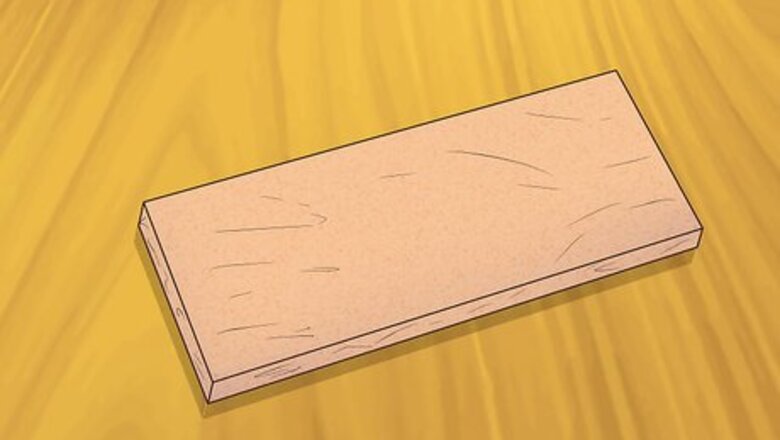
views
Preparing Your Surface
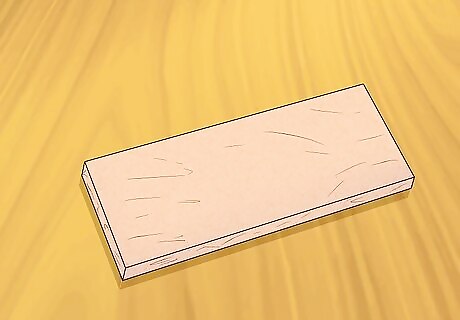
Pick out wood. Any wood surface can be wood burned. However, some are better than others. Light-colored and soft wood, such as bass, works especially well. This is because the wood burning stands out on the light color and you don't have to push very hard to make your marks. Woods with minimal grain also work best for wood burning. The grain of wood can cause the lines of wood burning to be bumpy and less precise. Wood with little grain allows you to draw smoother, more precise lines.
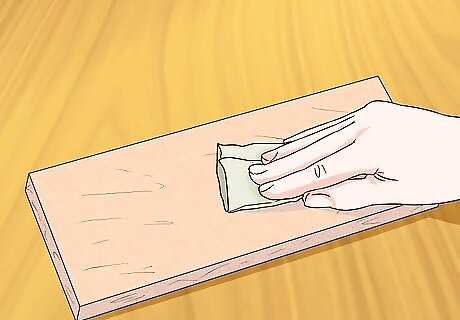
Prepare the wood surface. When wood burning you should begin with a smooth, sanded surface. While it is possible to wood burn a rough surface, wood burning that is done on a smooth surface will be easier to complete and the design will come out more neat and clear in the end. Sand off any coatings that are on the surface you will be wood burning. Burning through paint or stain can create a lot of toxic smoke that is not good to breathe in.
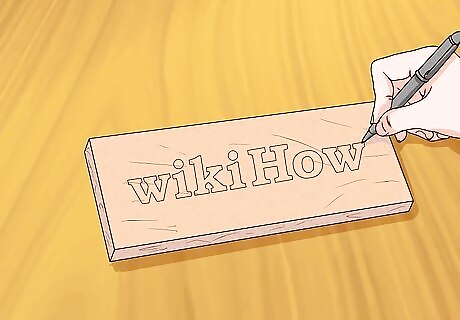
Use a template or draw the letters freehand on the wood. The easiest way to get your design onto your wood is to draw it right on with a pencil. This can be done freehand or by using a template or stencil to get a more exact design. It's also possible to freehand your letters with the wood burner. However, when beginning wood burning it is easier to have a pattern on the wood to follow.
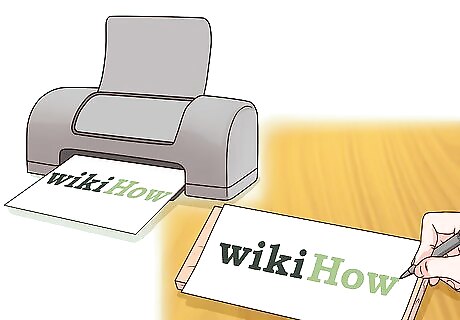
Transfer your design to the wood. Make a design on paper or on a computer and transfer it onto your wood surface. Begin by drawing the design on a piece of paper or by creating on a computer and then printing it out. Then place a piece of carbon paper on the wood and set the paper with the design on top of the carbon paper. By taking a pencil or stylus and tracing your design, you will transfer the design onto the surface of the wood. When placing the carbon paper on your wood, make sure the the carbon side of the paper is facing the wood. The side facing up is typically shiny in comparison.
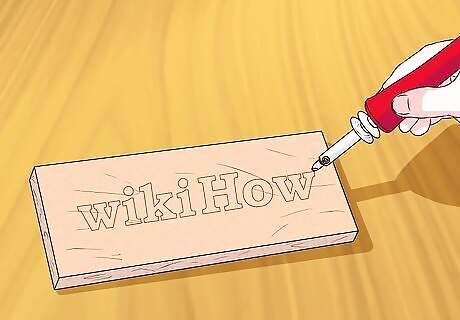
Use an image transfer wood burner tip. There is a technique in which you can transfer photocopied images onto wood using your wood burning iron. Buy an image transfer tip for your iron, which are sold specifically for this technique. Simply place the paper with the image on it face down on the wood. Then heat the backside of the paper gradually with your image transfer tip. The heat from the iron releases the ink from the photocopy and moves it onto the surface of the wood. This process can only be done with photocopies. If you have an ink jet printer, this process will not work. You need to use a special tip for your wood burning iron to do this. If your iron did not come with one of these tips, contact the manufacturer to see if there is one available.
Getting Tools Ready
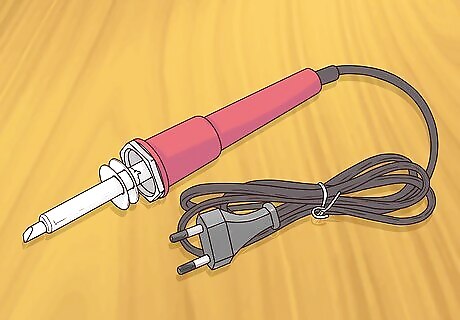
Purchase an iron. There are a wide variety of wood-burning irons available from online retailers and at craft and hobby stores. Wood burners typically come with a stand, a heat regulator, and a variety of tips. If you are new to wood burning, you may want to get a basic model, so you can figure out if you like wood burning without spending a lot of money. The price of wood burning irons can vary dramatically depending on the level of heat they can produce and what kind of heat controls they come with. You should be able to find a basic wood burner for about 40 dollars (USD). However, high quality wood burners that professionals use can cost over 200 dollars (USD).
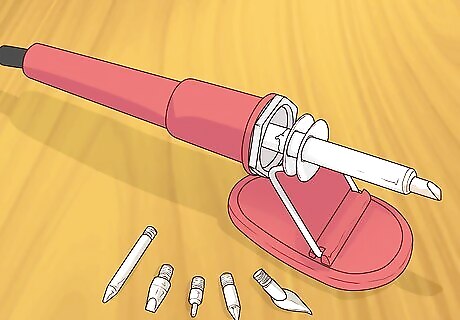
Pick a tip to use. Many wood-burning irons come with a variety of tips that can be screwed into the end of the burner. The tips typically come in a variety of sizes that you can choose from. In general, if you want to do small detailed work, use a small tip. If you want to make larger, thick letters, pick a bigger tip. In addition to large and small tips, there are differently shaped tips that make different types of lines. For instance, your wood-burning iron likely came with a tip that is teardrop shaped. This is made for shading. There are also tips that are made for drawing straight lines, which are wedge shaped and come to a point on on side. Once the iron has been heated up, use a pair of pliers to change the tip out. The pliers will save your hands from the hot iron.
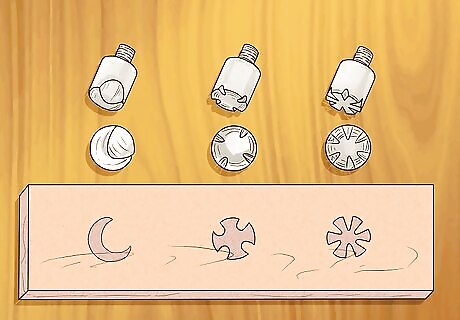
Consider using specialty tips. Some wood-burning irons come with specialty tips that are basically brands. These are iron tips that have designs on their surface that can be burned into wood with a simple stamping motion. In some cases, these specialty tips include letters. If you have letter tips that will work for your project, they will allow you to burn clear, quick letters onto wood. When using specialty tips to stamp letters, you will have to switch out the tip for every separate letter. Be careful when doing this and remember to use pliers, as the tips will be very hot.
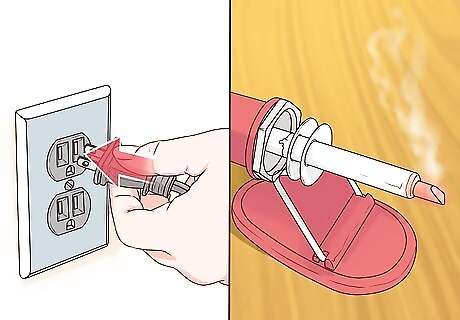
Heat up your iron. Plug your iron in and let it heat up for a few minutes. The instructions your iron came with will give you a general idea of how long your specific iron takes to heat up. Give your iron time to heat up before you start using it so that the lines you burn are solid and well defined. If your iron has heat controls, make sure that it is set to the heat your would like. If you want to make solid outlines, this usually requires an iron that is about 700 °F (371 °C). If you want to do some light shading, then you should set your iron to a more moderate temperature.
Using Your Wood Burner
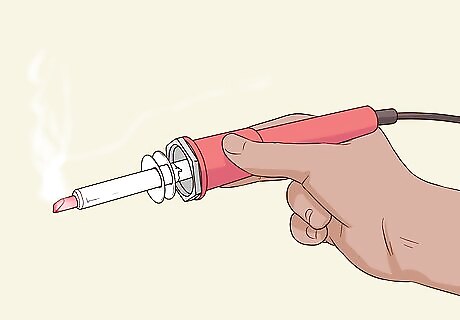
Hold the wood burner firmly but press on the wood lightly. When wood burning it is important to have a firm grip on your iron, so that it doesn't slip out of your hands and burn you. However, you do not need to press down on the wood very hard. An iron that is properly heated should easily burn the wood with moderate force. However, you can play with the amount of pressure you use on the surface to get different effects in the wood burning. For instance, If you want a darker area of your design, pressing down harder will make the burns deeper and darker.
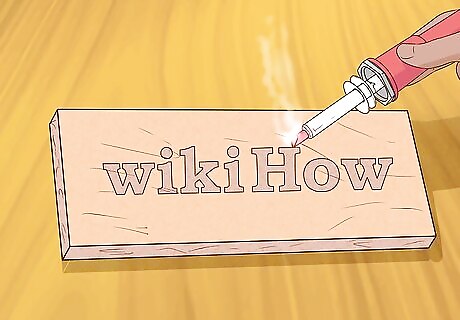
Move consistently across the surface of the wood. As you begin burning, use a constant speed in order to keep your lines consistent. Varying your speed will make some areas of your lines thicker than others. This is because the slower you go, the more time the iron has to burn down into the wood. Getting consistent lines can take some practice. If you are worried about have smooth lines, take some time to practice your technique on a scrap piece of wood before burning on your project wood.
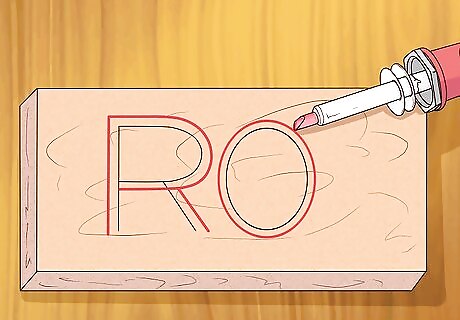
Trace the letters. Begin the burning process by tracing the outline of your letters. Use smooth motions and don't stop moving in the middle of lines. To get smooth and consistent lines, begin and end your strokes only at the end of lines within your letters. For example, the letter O should be done in one single stroke. The letter R can be done in three strokes: the upright line, the loop at the top, and the leg on the lower right side.
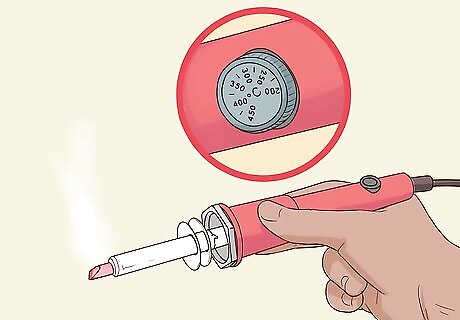
Adjust the temperature of your iron as you go. If you find that your lines are too light or too dark, then you may need to change the temperature of your iron. The temperature you need will vary depending on your technique and the type of wood you are using, so you may need to play around with it a little bit to get the results you want. If you have an iron that doesn't have a temperature adjustment knob, you will have less ability to fine tune the temperature. With this kind of iron, if it is not hot enough after a few strokes, you simply need to wait for the iron to heat up again before continuing your project.
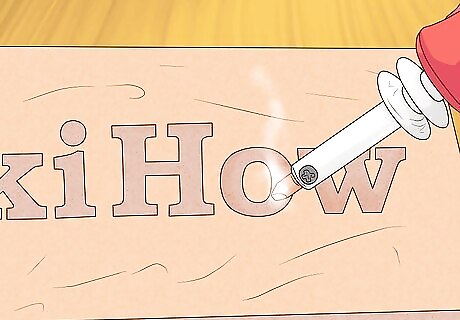
Fill in the letters. If your design includes thick letters, you may have to go back and fill in the centers of the letters after you have outlined them. Just use the same light pressure and smooth movement as you did with the outlines. Be sure to use a larger tip if you want to fill in large areas. Using a small tip to fill in a large area will take a long time and is likely to create inconsistencies in the color you get.
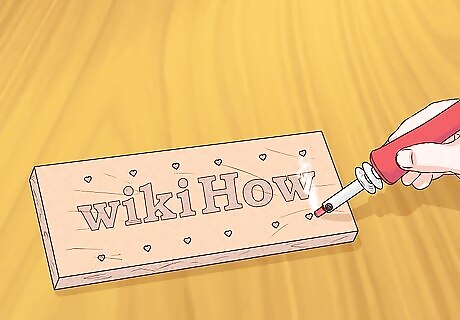
Add additional details to your design. Once you have burned the letters onto your piece of wood, consider adding additional embellishments. Adding decorative swirls or little flowers can add a fun little flourish to your work. There may be specialty tips in your tip kit that you can use to stamp designs on your work. For instance, many wood burning irons come with stamping tips that have hearts or flowers on them. Try using some of these to elevate your design.










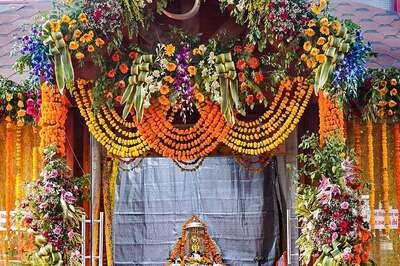





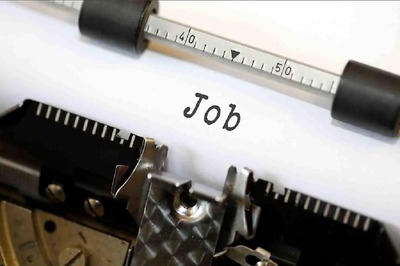


Comments
0 comment